Iranian Proxies Launch New Attacks Against US Forces In Syria

US and international forces in northeastern Syria were attacked with drones and rockets at least four times in the past 24 hours, a US military official said on Monday.

US and international forces in northeastern Syria were attacked with drones and rockets at least four times in the past 24 hours, a US military official said on Monday.
US forces came under attack three times on Sunday evening, including near the Al Omar Oil field and at a US base at al-Shaddadi, the official told Reuters. There were no casualties and only minor damage.
Multiple drones were fired at US forces at the Rumalyn Landing Zone on Monday morning, the official said. One drone was shot down but another damaged four tents, the official added.
The attacks came after the US carried out two air strikes on Sunday against facilities it said were used by Iran’s IRGC, its third set of strikes in Syria in as many weeks. However, these retaliatory strikes have failed to deter the aggression.
US troops have been attacked at least 40 times in Iraq and Syria since early October, when Hamas launched its terror attack on Israel. Statements, purportedly from militant groups, have said the assaults are in response to US support for Israel in the war in Gaza.
So far, at least 56 US personnel have suffered everything from minor wounds to traumatic brain injuries, though all have returned to duty, the Pentagon has said.
The US blames the attacks on groups backed by Iran - an assertion dismissed by Tehran which says the groups are acting on their own accord.
The United States has 900 troops in Syria and 2,500 more in neighbouring Iraq, whom it says are on a mission to advise and assist local forces trying to prevent a resurgence of Islamic State.
There is growing concern that the Israel-Hamas conflict could spread through the Middle East and turn US troops at isolated bases into targets.
Reporting by Reuters
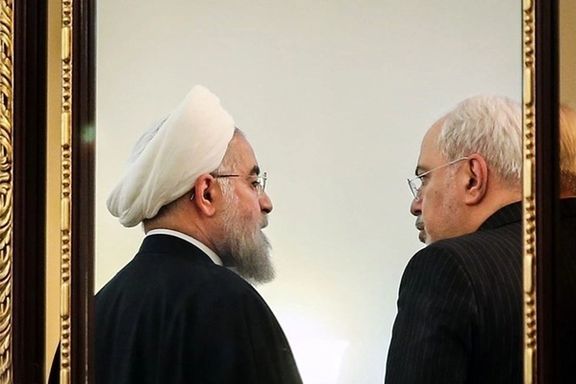
Iran's former foreign minister joined ex-president Hassan Rouhani to warn against Iran becoming involved in the Israel-Hamas war in Gaza.
Mohammad-Javad Zarif said the entry of Iran and Hezbollah into the ongoing conflict between Hamas and Israel only serves the interests of the Israeli government. “Israel is trying to drag the war outside its borders and involve the United States,” he added.
Zarif also highlighted Russia's historical alignment with Israel, noting that the Soviet Union was the first country to recognize Israel. He pointed out that two million Russian citizens currently reside in Israel. While acknowledging that the policies of Russia and China are relatively more balanced compared to the United States and Europe, Zarif stressed that neither Russia nor China supports the Palestinians.
Without going into details, Zarif revealed that a hardline group has in a letter to Supreme Leader Ali Khamenei pushed for dragging Iran into the war.
On Thursday, Hassan Rouhani, the ex-president of Iran, addressed the ongoing conflict in Gaza, warning that the regime's flaming of unrest is putting Iran at risk.
He emphasized the potential consequences of its being overly involved, directly or indirectly through its proxies, warning that "a mistake, a wrong decision, or an imprecise action could drag the flames of war towards us."
Growing concerns about the potential escalation of the Israel-Hamas conflict throughout the Middle East have prompted the United States to deploy additional air defenses, warships, and fighter aircraft to the region since Iran-backed Hamas invaded Israel on October 7. The deployment includes two aircraft carriers and involves the addition of thousands of troops.
Thousands of Hamas troops invaded Israel by air, land and sea, killing at least 1,200 mostly civilians and taking around 240 hostage. It has seen a relentless retaliation from Israel which has troops the deepest into Gaza since Hamas took over the strip in 2007, with airstrikes killing thousands in the densely populated coastal enclave.
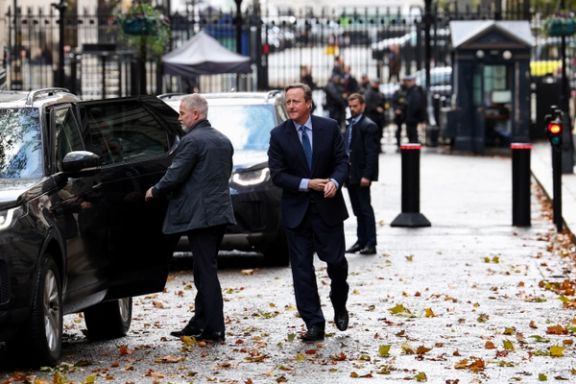
In a shock cabinet reshuffle, former PM David Cameron has been brought back into politics as the Conservative party's foreign secretary.
It came following the firing of home secretary Suella Braverman, as she was the most outspoken member of government to critizing the police for its handling of pro-Hamas protests in the UK’s streets.
The protests, partly supported by Iran, had brought hundreds of thousands of people to the UK’s streets, including across the British capital, leading to a wave of antisemitism and Islamist manifestations in Britain.
In a shock move, she has been replaced by foreign minister James Cleverly, with the role of foreign minister going to former PM David Cameron, who stepped down after the Brexit referendum in which the UK voted to leave the European Union.
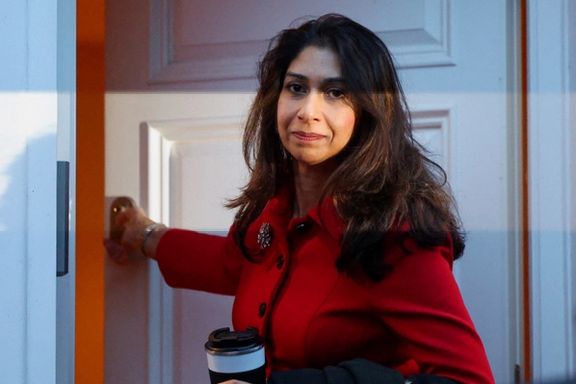
It was Cameron who during his time as the British PM between 2010-2016, reinstated relations with Iran. He met with President Hassan Rouhani at the UN headquarters in New York in 2014 in the first such meeting since the Iranian Revolution in 1979.
He was charged with reopening diplomatic ties which had been cut after Iranian regime loyalists stormed the British embassy in Tehran in 2011.
In 2013, the election of what appeared to be a more moderate Rouhani, replacing Mahmoud Ahmadinejad, paved the way for a thaw in ties. In 2014, the UK reopened its embassy.
The 2014 meeting focused on nuclear talks but also addressed the rising threat of the Islamic State group, which at the time had taken over much of Syria and Iraq.
A statement from the PM’s office at the time offered signs of progress, and said: “The PM and president acknowledged that there had been significant differences between their countries in the past, and agreed that we should seek to progressively improve our bilateral relationship.”
But almost a decade later, little has changed with Iran remaining one of the world's largest funders of terror. The PM office at the time had stated: “The prime minister and president noted the threat posed to the whole region by ISIS, and agreed that all states in the region must do more to cut off support for all terrorist groups, including financial support.”
Since then, in addition to being a state sponsor of terror, Iran has been declared by the UK as one of its biggest domestic threats with numerous foiled attacks on British soil in the last year. This includes MI5 admitting it could no longer secure the offices of Iran International which had come under threats from Iranian state agents, forcing a temporary relocation to Washington.
Cameron has been out of politics for several years, penning his memoirs and delving into business, including Greensill Capital, a finance firm which later collapsed.
In 2015, Cameron felt the wrath of interfering in US politics when he attempted to lobby senators against a new bill imposing fresh sanctions on the Iranian regime. At the time, one Republican told The Telegraph that the prime minister's intervention into American politics was "not a productive move”.
The prime minister had warned that even the threat of fresh sanctions could lead to the breakdown of the delicate nuclear negotiations going on in Geneva between Iran and a six-nation bloc that included Britain and the US.
In contrast, just weeks later, Israeli prime minister Benjamin Netanyahu was welcomed by Republicans when he came to Washington backing the US to be more hawkish on Iran policy.
Cameron's previous attempts to adopt a lenient approach toward Iran were consistent with the policies of then-US President Barack Obama. The Biden administration is now pursuing a similar course of action, but it is encountering criticism in the process.
In 2015, Mark Dubowitz, the head of the Foundation for the Defence of Democracies, a think tank that supports deadline-triggered sanctions against Iran, said Mr Cameron's intervention did not appear to have changed the argument on Capitol Hill. "Senators don’t seem to be persuaded by David Cameron, who they perceive to be even further to the Left than the Obama administration on Iran," he told The Telegraph.
A recent investigation in The Times found around a dozen regime-backed organizations working on British soil, showing a deep infiltration into UK society through the likes of religious, charitable and educational institutions.
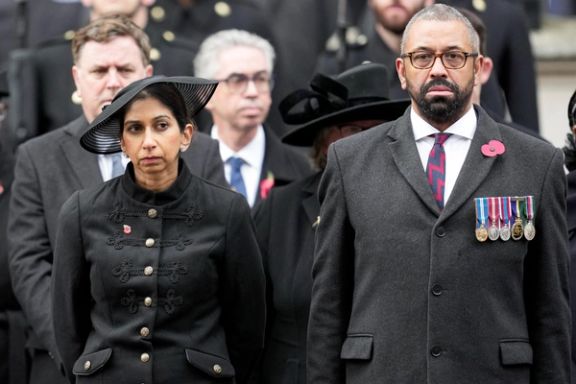
Just weeks ago, now Home Secretary James Cleverly was butting heads with his predecessor Suella Braverman over the contentious issue of designating the IRGC, like its ally, the US, which designated the group in 2019.
Speaking to the Jewish Chronicle in September, Cleverly said that “many of the things that people want” from proscription were “actually being achieved by our sanctions regime” that is already in place.
He added: “We will always keep our options open and we will always act in our country’s best interests.”
In September, Cleverly insisted that “any decision we make on proscription or sanctions is always done with the protection of British nationals and British interests at heart”.
Meanwhile, at least eight IRGC commanders have recently been offered the podium to give talks at British universities, pumping Islamic Republic rhetoric into the minds of young students.
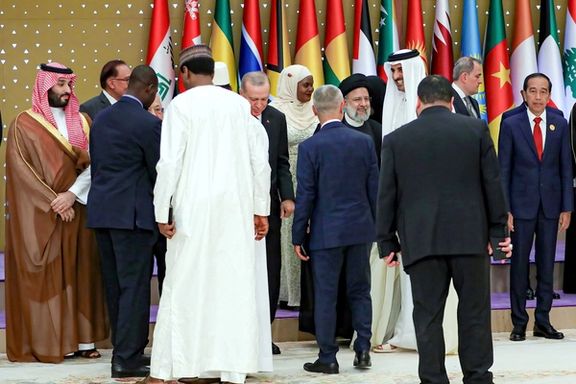
Iran's Foreign Ministry Spokesman claimed that Saturday's Islamic summit was a success due to “Iran's diplomatic efforts and Saudi Arabia's good cooperation.”
Nasser Kanaani said during a briefing on Monday that “The diplomatic efforts of Iran to mobilize the Arab and Islamic countries and draw the public's attention to the crimes of the Zionist regime have been successful.”
After closed-door negotiations in the Saudi capital, Riyadh, the summit concluded with a statement calling for a an immediate ceasefire, an arms embargo against Israel and condemning its aggression in Gaza. Despite this, no concrete plan of action was provided nor did the statement address Gaza's possible future scenarios.
Despite condemning Israel's actions in Gaza and demanding an end to the war, Arab and Muslim leaders' meetings highlighted their differing opinions.
Iran and Syria saw their efforts to impose punitive economic and political measures on Israel rejected by other Muslim states and excluded from the final resolution passed on Saturday.
Iranian calls for severing relations with Israel and declaring the Israeli army a "terrorist organization" were ignored as those Arab nations that have diplomatic relations with Israel pushed back, stressing the importance of maintaining open lines of communication with Netanyahu's government.
Since Hamas mounted a surprise ground and rocket attack on numerous Israeli targets on October 7th, killing about 1,200 Israelis, mostly civilians, there has been a massive retaliation against the enclave. Gaza officials say so far more than 11,000 residents have been killed, including children, a figure that cannot be independently verified.

Iran is not afraid of the United States, a top IRGC general said Monday, although more than a month after the start of the Gaza war, Tehran has treaded a careful line.
Amir Ali Hajizadeh, the commander of Iran’s aerospace force claimed the US is communicating with Iran in a humble tone about preventing an escalation in the Middle East. He also repeated familiar rhetoric that “Iran is currently at the pinnacle of power and cannot be threatened.”
Hajizadeh’s defiant remarks followed a third US strike on Iranian targets in eastern Syria Sunday night, after Iranian proxy militia groups continuously attacking US bases with drones and rockets.
Following the US strike, Defense Secretary Lloyd Austin left open the possibility of more action against Iran-linked groups if attacks against American forces in Iraq and Syria do not stop.
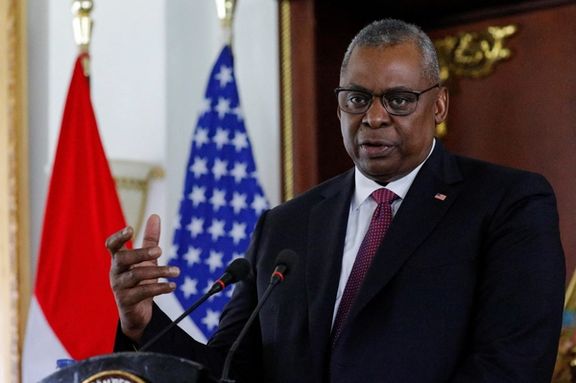
The US military’s air strike Sunday targeted a training facility near the city of Albu Kamal and a safe house near the city of Mayadeen. Iran’s Revolutionary Guard have set up a strong presence in the region, trying to facilitate the flow of weapons and ammunition from Iraq into Syria and Lebanon.
The strikes came after at least 40 attacks against US and coalition troops in Iraq and Syria by Iran-backed forces in recent weeks, as regional tensions mount over the Israel-Hamas war. At least 45 US troops have suffered traumatic brain injuries or minor wounds.
"These attacks must stop, and if they don't stop, then we won't hesitate to do what's necessary, again, to protect the troops," Austin told reporters at a news conference in Seoul on Monday.
Iran has used the tactic for years to put pressure on the US, with the ultimate goal of forcing Washington to withdraw its military forces, which would allow Iran a freer hand to project power in Iraq and Syria. Iran escalated such attacks in December 2019, before former President Danald Trump authorized the killing of Iran’s top Middle East operative Qassem Soleimani in an air strike in January 2020.
The attacks had subsided for more than a year before the October 7 Hamas terror raid into Israel that ignited the Gaza war.
Austin said the latest air strikes in eastern Syria targeted facilities used by Iran's Revolutionary Guard Corps and related groups.
"These strikes are intended to disrupt and degrade the freedom of action of these groups, which are directly responsible for attacks against US forces in Iraq and Syria," Austin said.
The United States has 900 troops in Syria, and 2,500 more in neighboring Iraq, to advise and assist local forces trying to prevent a resurgence of Islamic State, which in 2014 seized large swathes of both countries but was later defeated.
There is growing concern that the Israel-Hamas conflict could spread through the Middle East and turn US troops at isolated bases into targets of heavier weaponry than the smaller rockets and one-way drones seen so far.
The United States has deployed additional air defenses and sent warships and fighter aircraft to the region since the Israel-Hamas conflict erupted on October 7, including two aircraft carriers, to try to deter Iran and Iran-backed groups.
The number of troops added to the region is in the thousands.
Reuters has reported that the US military was taking new measures to protect its Middle East forces during the ramp-up in attacks by suspected Iran-backed groups and was leaving open the possibility of evacuating military families if needed.
The measures include increasing US military patrols, restricting access to base facilities and boosting intelligence collection, including through drone and other surveillance operations, officials say.
It was still unclear whether anyone was killed in the Sunday US strikes in Syria.
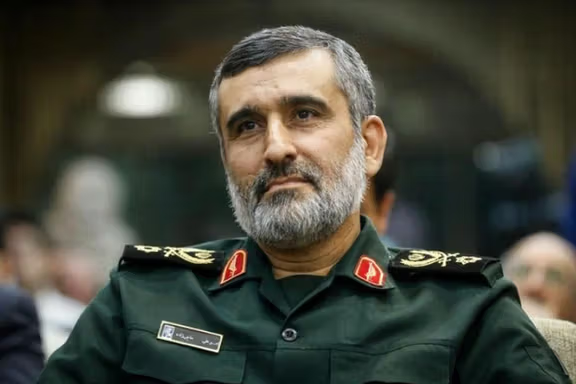
The commander of the Aerospace Force of the IRGC has declared that the US is engaging in diplomatic talks with Iran using a "language of request and plea" amid attacks on US bases.
Amir-Ali Hajizadeh claimed on Monday that “Iran is currently at the pinnacle of its power and cannot be threatened".
Since Iran-backed Hamas declared war on Israel on October 7 and the US supported Israel's right to defend itself, at least 40 proxy attacks have taken place against US bases in Iraq and Syria. On Sunday, the US ordered two retaliatory attacks. Defense Secretary Lloyd Austin said the strikes targeted Iran’s Revolutionary Guard and affiliated militia groups.
Hajizadeh also acknowledged the expanding conflict in the region, with Lebanon becoming embroiled. Hajizadeh speculated on the possibility of further escalation, stating, "The future is uncertain, but Iran is prepared for all circumstances."
The recent stance from Hajizadeh sharply contrasts with his remarks from the previous week, where he had suggested a degree of apprehension. He revealed that Iran chose not to retaliate against the US for the killing of Quds Force commander Qassem Soleimani in 2020, deeming it illogical.
A video released by Etemadonline showed Hajizadeh explaining that a war at that time could have resulted in significant casualties for Iran, both civilian and military, and set the nation back by two decades.
The decision to avoid full-scale confrontation with the US was based on the assessment that such a conflict would not yield the desired results, according to Hajizadeh.
Iranian officials continue to issue threats against the Jewish state. Iran's long standing support for groups like Hamas, coupled with its decades-long call for the destruction of Israel, adds to the complexity of the geopolitical landscape in the Middle East.